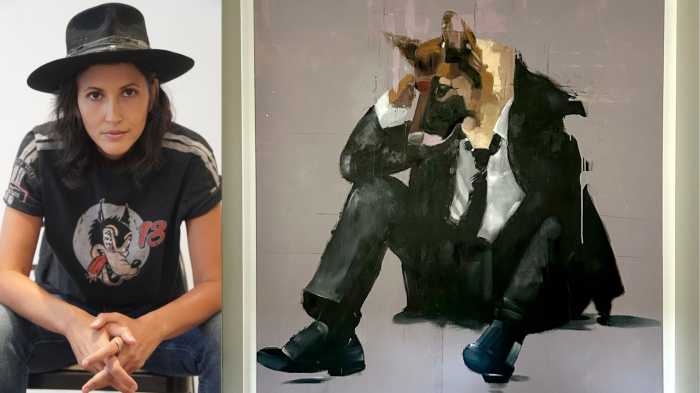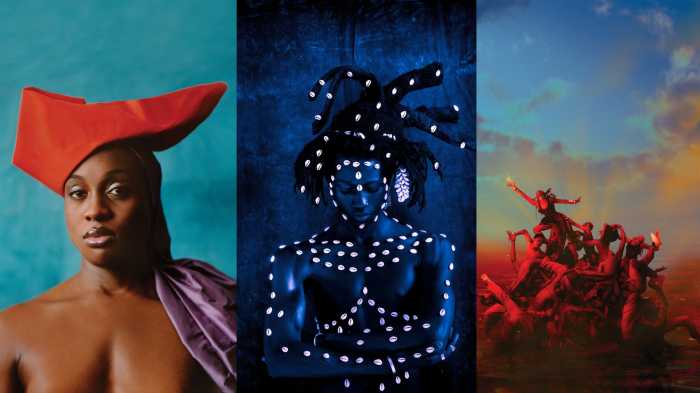By David Noh
The boys of ‘Billy,’ ‘Godot’ mystery mucus, Egyptian gay director
The New Dramatists’ lunch (May 19) at the Marriott Marquis paid touching tribute to the late Horton Foote (1916-2009). Present at the event were his children, Hallie, Daisy and Walter, who, when their father died last March, were the first to call New Dramatists to tell them they wanted the show to go on, regardless. Foote led a long, exemplary life, both in and out of the theater, and I will always treasure the memory of meeting this courtly Southern gent during the Off-Broadway run of “Dividing the Estate.” He sat at the back of the theater for every performance, admitting it was out of “sheer egomania.”
This event, as always, was packed with past and present Tony nominees. As much as I adored Karen Olivo in “West Side Story,” Haydn Gwynne deserves to win Featured Musical Actress for “Billy Elliot.” She created the role from the ground up and is in the Marian Seldes –– whom she was talking to –– tradition of great character actresses, bringing real heart and truth to this sometimes overproduced show.
When I mentioned this, she said, “I’m going to go and cry now… I started the show in London in the very early stages, so I know where the bodies are buried. I hadn’t done a musical since ‘City of Angels’ in 1993. We got the most fabulous reviews and ran for eight months, but it never attracted the right audience. If we’d first played at the National Theatre and then transferred into the West End it would have been better. Audiences needed to know that it was very much a sophisticated, thinking piece. That audience does exist in London, but you have to tell them that that’s what the show is, because you don’t want to attract the wrong audience who’ll think, ‘This is too heavy.’
“In London, we look to Broadway as the birthplace of musicals. ‘Billy Elliot’’s success is something we don’t take for granted, because for us to bring this show here is like an American company bringing Shakespeare to Stratford-on-Avon. Broadway is where this particular art form was born and thrives, and we hold that in reverence. For instance, when “The Producers” came over, people could not wait to see it… and loved it!”
Gwynne’s character, Mrs. Wilkinson, is an update of those terrific old ballet mistresses with the pounding canes that Maria Ouspenskaya and Judith Anderson once played in film, but she said, “Maybe because I’m not a dancer and I haven’t gone through all that, I started more with my imagined view of that woman and how she fits into the story, and the way everybody is leading a sort of disappointed life.”
The three “Billy Elliot” boys were properly be-suited and awestruck, their responses filled with “Amazing!,” which Marian Seldes had just informed me was the new “awesome.” Latin-looking David Alvarez was especially cagey when I asked him what was his background was. “Ballet.” “No, I meant ethnically – Hispanic?” “I’m Canadian.” O-kay. It kind of reminded me of when Brad Wong became B.D. Wong in “M. Butterfly,” some producer’s idea of throwing off the scent in that prehistoric time when gender-fucking was theatrically groundbreaking and not a given.
Far more expressive was the delightful, non-nominated David Bologna, who plays Billy’s engaging cross-dressing friend, Michael. When we were gay little boys, who didn’t love to sneak into Mommy’s closet –– I remember being so proud when I created a bustle out of her bathrobe, and wish I’d seen someone like Michael onstage back then. Bologna said, “It’s a really fun role to play. I see Michael as a crazy, eccentric guy who isn’t into your typical sports, but he’s okay, expresses himself, and loves it. I never dressed up myself. I wasn’t a jock either, but when I was younger I did like to sing and dance.
“A lot of kids were at the ‘Billy’ auditions, but for my callback, there were only twelve of us. It was neat because they tried to make it feel as lightweight as possible and not like an audition –– to not put that stress on us –– which was really good, as we weren’t nervous or stressed out. Being in the show is an incredible feeling, especially at the end when I tell the audience to give me more applause. You have them in the palm of your hand and you can do anything. I think that was the part of the original choreography from London. I’m from Austin, Texas, but born in New Orleans. I think when I moved up here I just lost my drawl, but we got that Southern hospitality. I had never studied any formal ballet or tap, was actually an Irish dancer, and that really helped with my tap.”
John Glover from “Waiting for Godot” cleared up a pressing mystery for me, especially in these Swine Flu-scared days. What was that mucus-y substance that kept drooling out of his nose and mouth whenever he was onstage? “Mucus! I just push it out every night. Some nights I get more than others. It’s all from the text. Estragon talks about how Pozzo slathers. Someone equated me with that horse in ‘Gone with the Wind’ Scarlett beats to death. Drool is drool.”
The divine Chita Rivera, the sexiest woman in the room, still lovin’ the gay cruises she gets booked on, was fascinated to hear about my spotting Carol Lawrence and Grover Dale taking the subway to the “West Side Story” opening night party, and gave me her honest but strictly off-the-record opinion about this current production.
Lynn Cohen, familiar to many as Magda, Cynthia Nixon’s nanny on “Sex and the City,” is the always fun, unofficial hostess of the press room, and told me, “I just finished ‘Chasing Manet’ with Jane Alexander and am going to do a film next week with Chris O’Donnell –– he better be cute! As for me being in the next ‘Sex and the City’ movie, from your mouth to God’s ears… I loved doing the role. It’s the best because they’re all like a repertory company and Cynthia is a great actress. I based Magda on my grandmother from the Ukraine. You pull up everything from the past.”
I ran into Martin Pakledinaz, Tony-nominated for costume design for “Blithe Spirit,” and he told me, “Dressing Angela Lansbury –– how intimidating was that at first? She’s such a style icon from ‘Mame,’ ‘Manchurian Candidate,’ and ‘Murder, She Wrote,’ in those simple suits which are really not that simple to execute. She couldn’t have been easier. She asked me, ‘What did you think of how Anthony Powell dressed me in ‘Death on the Nile’? And I said, ‘Wow, you want to go that high, huh?’ So we went for it and, regarding her Mrs. Lovett/ ‘Sweeney Todd” braid buns over the ears, that was her idea. I, too, mentioned the similarity to ‘Sweeney,’ but she said, ‘No one will remember that!’ She brought in a picture of her nanny who wore her hair that way, and that always stayed with her.”
Rupert Everett was very particular about his costumes and fit, and remarked that he had never had so many costume meetings on any project. He specified no smoking jacket, as that would look “too gay.” Pakledinaz dressed Jayne Atkinson’s ghostly Ruth in a similar tailored suit to what she wore in life: “They usually bring her back in an evening gown, which doesn’t make much sense,” while Christine Ebersole discovered the after-life effect of her ethereal chiffon sleeves in tech rehearsal. “She just started playing with her sleeves over her hands and said, ‘Look at this!’ Those are the moments when a designer goes, ‘Thank you, God!’”
Julie Halston, with her devastating, desert-dry delivery, had everyone –– as they say on Long Island –– hysterical laughing, at her show at Birdland (May 19), with her accounts of growing up in Comack, where she mistook her father’s testicle during an Easter Egg hunt. (“I don’t remember dye-ing a pink one?”) Being Italian, she was once reduced to childhood tears when class teasing forced her to ask her mother if they were Mafia: “Would we live in a shithole like this if we were?” (Take that you broads from “The Real Housewives of New Jersey” –– and how much of a guilty pleasure is that horror show?)
Halston had the gayest night in the history of the world when she went as Liza Minnelli’s guest to the “first Barbra Streisand Farewell Tour” at Madison Square. Imagine massed hordes of people davening at the sight of Liza, and then having to stand guard in the public ladies room for her (she was refused the usage of Streisand’s private loo), while some woman screams, “It’s Liza! I can’t pee!” and, later, Richard Simmons, writhing in agony on the floor in a red sequined jumpsuit, shrieking “Barbra won’t see me! Why?!”
BAM Rose Cinemas is presenting a retrospective of Egyptian filmmaker Youssef Chahine (1926-2008). Series curator Elliott Stein, who will be speaking on June 3, told me, “He was a leading director in Arab cinema, making movies about Israelis who fuck Palestinians, Muslims who fall in love with English colonials they’re supposed to kill. In his autobiographical trilogy, ‘Alexandria… Why?’ he depicts himself as being bisexual, and there’s also his critique of Muslim fundamentalism in several films. These are very ballsy things to do in movies financed by the Egyptian government –– just to go out in the world and survive assassination after doing all that.
“As a filmmaker, his films are often really rough but it’s the ballsy quality about them which compels. That’s the one adjective that really describes him to me. His films are not hard-core, but it’s obvious what’s going on. There’s not much real nudity, but there are gay romances and affairs which are physical. How far could he go? But he went as far as he could. He played a depraved sex maniac in his breakthrough film, ‘Cairo Station,’ a candy vendor who goes around killing girls out of sexual frustration, and he’s very good.
“Twenty years ago, I got an invitation from Georgetown University to talk about his films with him during a weekend retrospective. I spent a lot of time with him, had drinks, went to the Egyptian cultural attaché where he was staying. He generally traveled with handsome young men. Walter Reade had a retrospective on him ten years ago, and already he was a little shaky but he was okay, and we had coffee and caught up. He died last year. The New York Times obits for film are usually terrible, but his was very good, the only one I’ve ever seen by A.O. Scott, their first string critic.
“He was a magnificent, formidable figure of Arab cinema for more than half a century, bursting with energy and force, and very political towards the end, very anti-Israel in terms of their foreign policy toward Palestinians. But he had a lot of Israeli friends, and his films were shown in Israel, as well as gay film festivals everywhere, extraordinary for someone from Arab cinema. He was an outspoken critic of Egyptian President Mubarak, as well as American foreign policy. When asked in an online interview whether he thought Egypt would become more free and liberal in the near future, his reply was, ‘No, neither in the near nor in the faraway future.’”





































